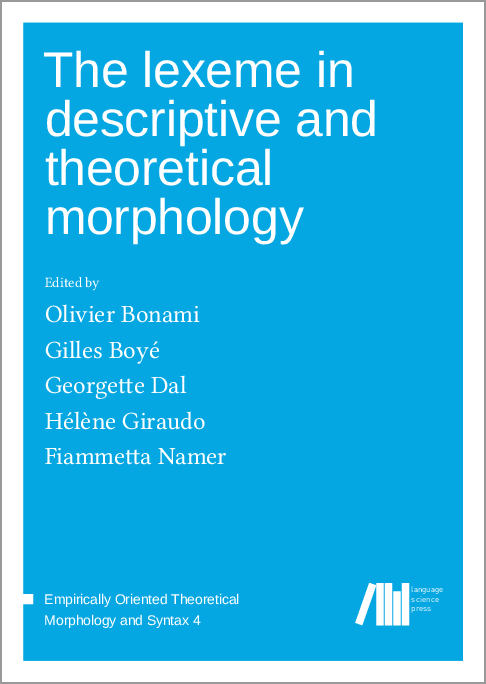We log anonymous usage statistics. Please read the privacy information for details.
The lexeme in descriptive and theoretical morphology
Synopsis
After being dominant during about a century since its invention by Baudouin de Courtenay at the end of the nineteenth century, morpheme is more and more replaced by lexeme in contemporary descriptive and theoretical morphology.
The notion of a lexeme is usually associated with the work of P. H. Matthews (1972, 1974), who characterizes it as a lexical entity abstracting over individual inflected words. Over the last three decades, the lexeme has become a cornerstone of much work in both inflectional morphology and word formation (or, as it is increasingly been called, lexeme formation). The papers in the present volume take stock of the descriptive and theoretical usefulness of the lexeme, but also adress many of the challenges met by classical lexeme-based theories of morphology.
Chapters
-
Introduction
-
Morphology and words: A memoir
-
Lexemes, Categories and Paradigms: what about cardinals?
-
Word formation and word history: the case of CAPITALIST and CAPITALISM
-
Nom et/ou adjectif ? Quelle catégorie d’output pour les suffixés en -iste ?
-
Les adverbes en -ment du français : lexèmes ou formes d’adjectifs ?
-
Des lexèmes à forme unique: comment le créole réanalyse les dérivations du français
-
Some remarks on clipping of deverbal nouns in French and Italian
-
Lexeme and flexeme in a formal theory of grammar
-
The morphology of essence predicates in Chatino
-
Why traces of the feminine survive where they do, in Oslo and Istria: How to circumvent some ‘troubles with lexemes’
-
The Haitian Creole copula and types of predication: a Word-and-Pattern account
-
On Lexical Entries and Lexical Representations
-
Troubles with flexemes
-
Reduplication across boundaries: The case of Mandarin
-
La parasynthèse à travers les modèles : des RCL au ParaDis
-
Much ado about morphemes
-
Les affixes dérivationnels ont-ils des allomorphes ? Pour une modélisation de la variation des exposants dans une morphologie à contraintes
-
A frame-semantic approach to in affixation
-
Word formation in LFG-based Layered Morphology and Two-Level Semantics
-
Lexeme equivalence or rivalry of lexemes?
Reviews
-
Review in Language 96(2)
by Laurie Bauer
published June 1, 2020
[...] As a festschrift, this collection ticks all the boxes by showcasing the theoretical and practical advances that derive from the work of the honoree. There is not a bad paper in the collection, and while the writers do not agree among themselves, there is something for anyone interested in a lexeme-based morphology (or indeed, any model of morphology, whether lexeme-based or not) to consider and discuss. As a collection of papers, independent of the reason it has been put together, it illustrates the kind of work that is going on in Francophone morphological study, of which the Anglophone world is largely ignorant and from which it could benefit. The book contains papers from leading Francophone morphologists whose work is worthy of wider appreciation. As a book about lexemes, it illustrates profusely some problems and advantages of a lexeme-based morphology from multiple viewpoints. It does not necessarily present a coherent view on all topics, but one sufficient to give both people working within such a model and people working within different models an insight into areas of potential difficulty and areas of real strength. [...]




